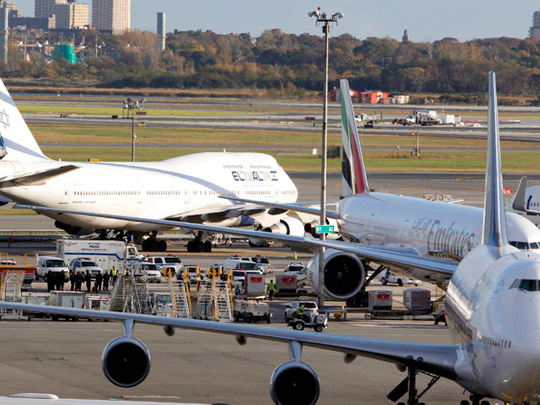
Washington: FedEx and UPS scrambled to react to an apparently coordinated global terror attack using their services Friday, shutting suspect routes and throwing their doors open to investigators.
The US package delivery firms froze deliveries from Yemen after two packages with explosives were intercepted en route to the United States and scores more came under investigation.
FedEx earlier reported confiscating a suspicious package "at the FedEx facility in Dubai," according to a company statement.
"The shipment originated in Yemen and as an additional safety measure, FedEx has embargoed all shipments originating from Yemen."
UPS made a similar move after two of its aircraft were grounded in Philadelphia, Pennsylvania and one in Newark, New Jersey on suspicion they may be carrying explosives.
"Because security is of the utmost importance, UPS is immediately suspending service out of Yemen until further notice," the firm said.
The route closures are not expected to dramatically affect either company, but heightened screening and increased scrutiny of procedures could spell a shake up in the weeks and months to come, experts said.
"I don't think it's going to have a widespread impact on global operations at all, obviously it is going to affect shipments coming out of Yemen and the Middle East in general," said Doug Caldwell, head of global parcel and shipping consultancy Parcel Research.
"There will be advanced scrutiny of shipments at the origin point before they get on an airplane, and that might mean slight delays."
According to Caldwell, UPS and FedEx will likely focus on two possible weak points in their logistic chains: how regular account-holding customers handle their cargo and the screening of walk-in clients.
For so-called "known shippers" who provide the bulk of business, carriers will be asking "is that customer being careful with those packages? In other words, they are putting them out on the loading dock for anyone to come by and throw another package on top before the carrier gets there."
"More importantly they will be looking at unknown shippers, that is somebody walking into a store in Yemen or anywhere else and saying 'hey I want to send this package to the United States.' They'll want to know if they provided ID, what's in the package."
But like the shipping industry - long seen by security experts as the soft underbelly of anti-terror defenses - the sheer quantity of global trade makes rigorous hands-on inspection of every package in every country impossible.
According to recent company figures UPS alone delivers more than 10 million packages a day.
Firms instead rely on technology like scanners and x-ray machines to catch suspicious packages, and place extra focus on suspect routes.
Carriers have frequently closed services in certain countries. FedEx has barred services to Iran, Sierra Leone, Sudan due to embargoes and political unrest.
The focus is also likely to swing on delivery firms' relationships with local contractors in places where they do not have outbound services.
Because of the low volume of packages coming from Yemen, both companies had used local carriers.
FedEx used the Falcon Aviation Group, and UPS a firm called Sun Tours and Travel for what Caldwell said could not amount to more than several hundred packages a day.
"There are probably examinations of what the current security measures are in place right now, no question that is going on as we speak."
In New York, shares in FedEx fell over one percent on the news, while UPS saw its share price fall almost half a percent.












